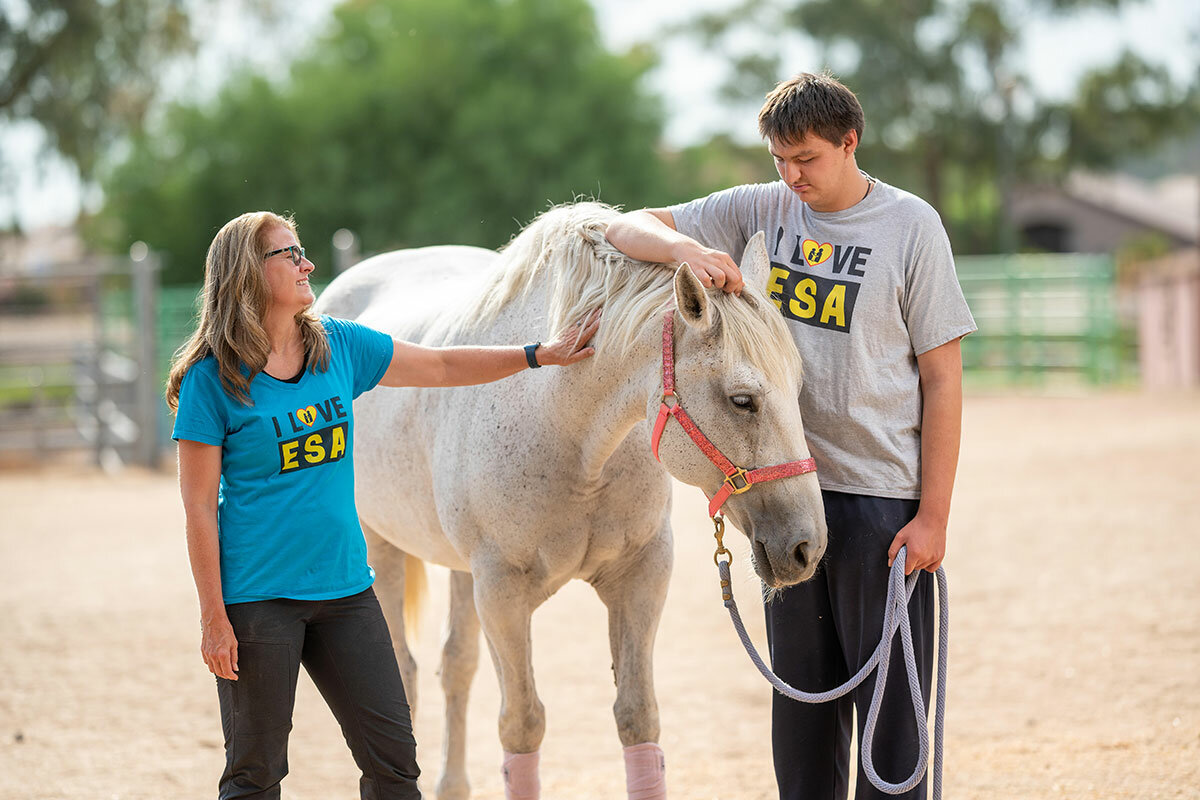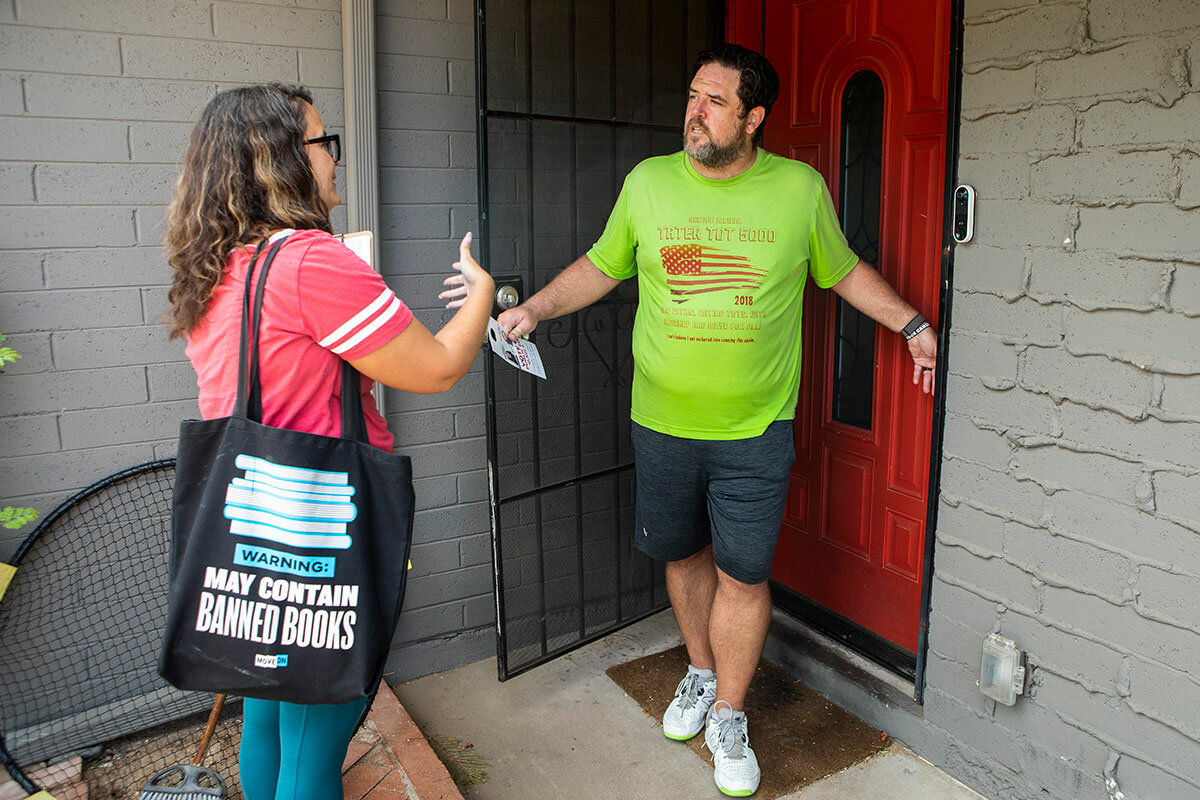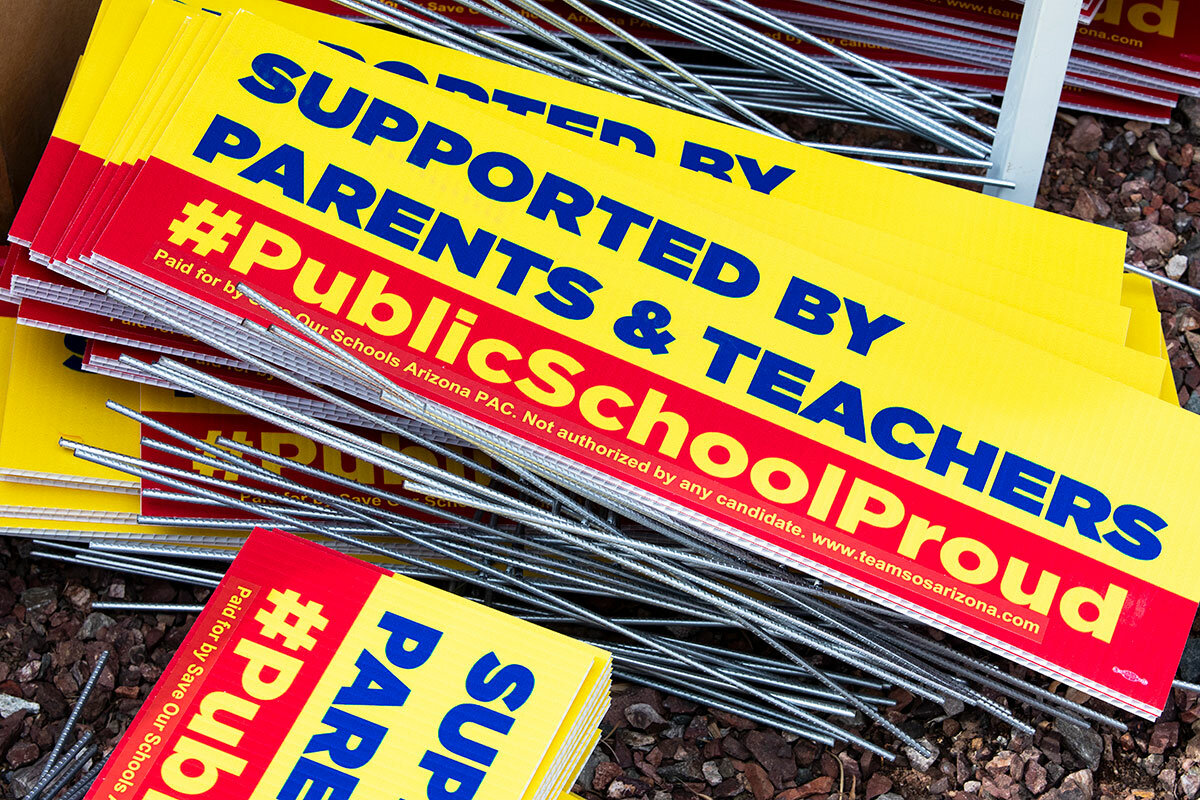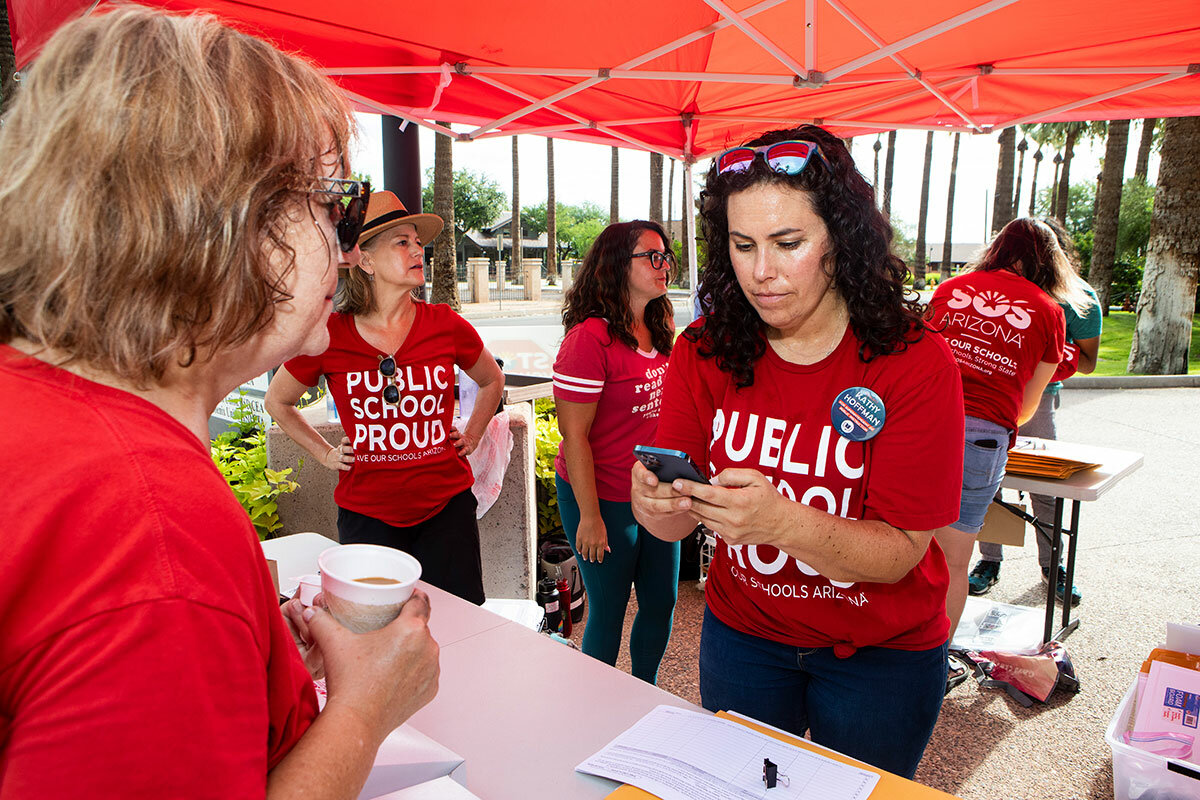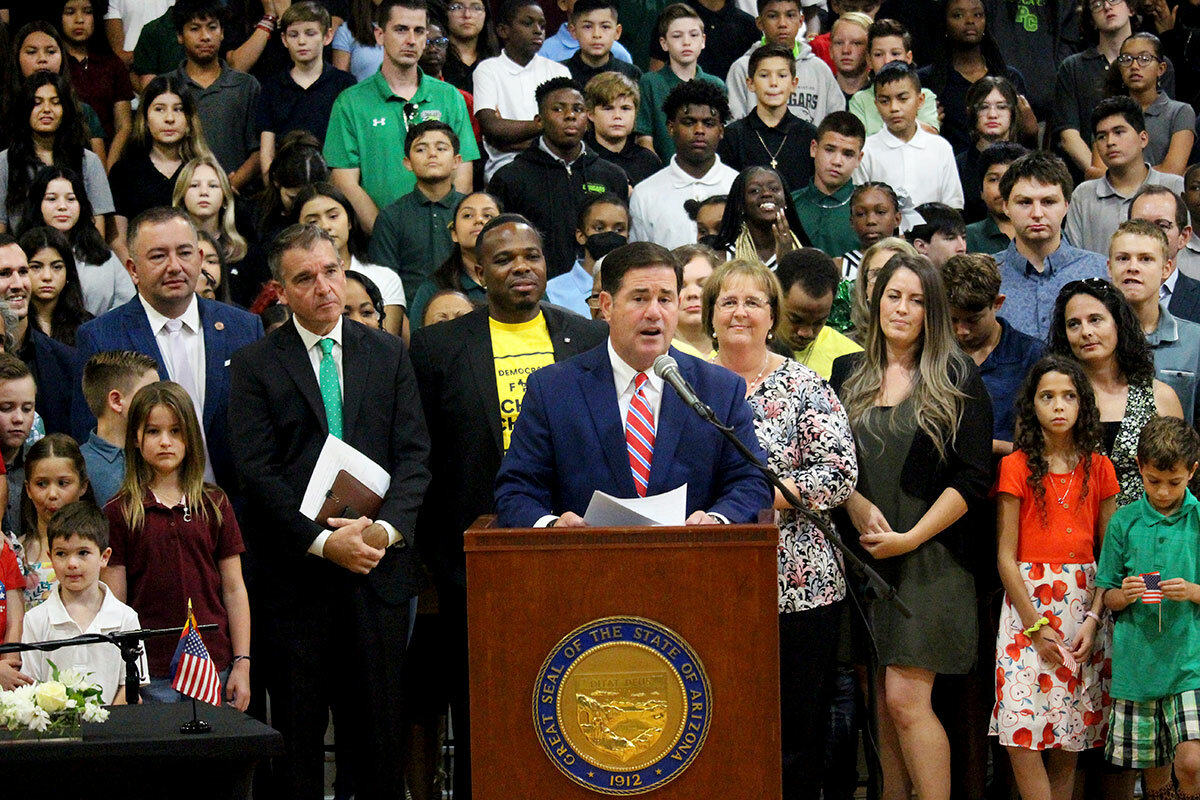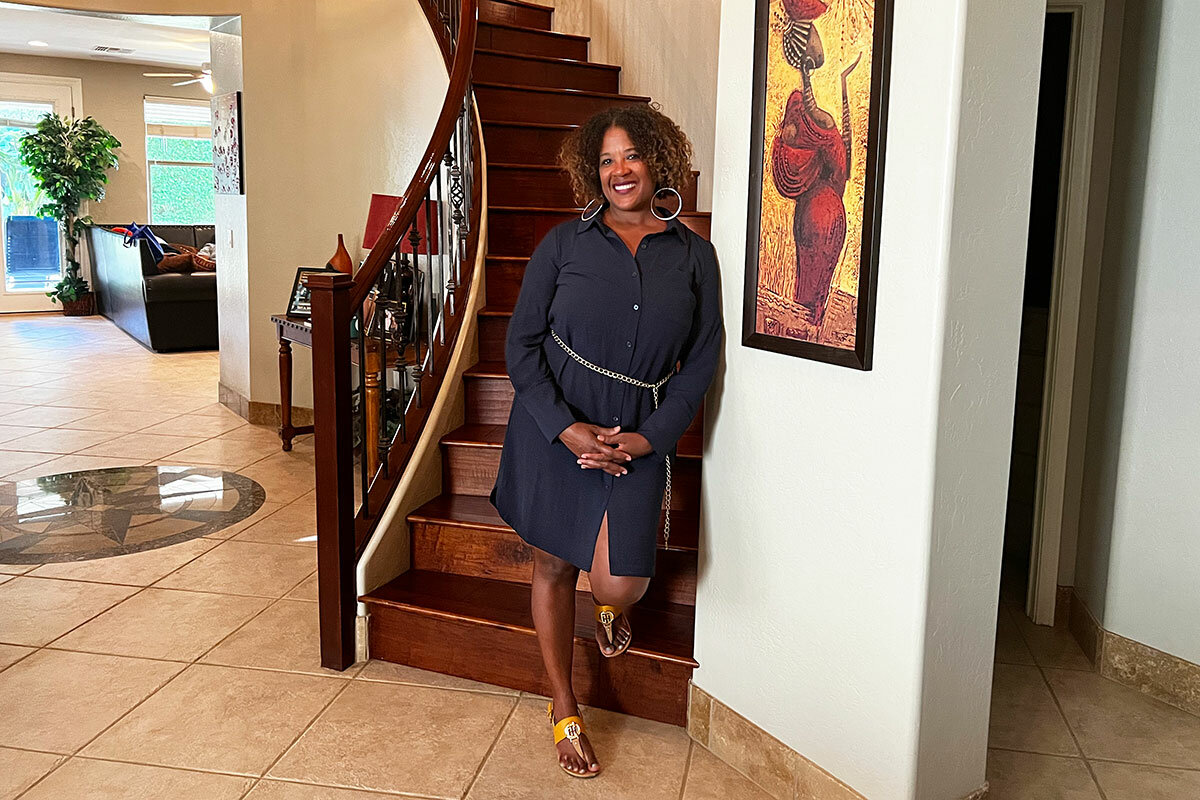How Arizona became America’s school choice lab
Loading...
| PHOENIX
In July, Arizona’s Republican governor, Doug Ducey, signed into law a major expansion of his state’s scholarship program, which he and supporters around the country are calling “the gold standard for educational freedom.”
The state has in many ways become a leading laboratory for school choice ideas that have simmered in U.S. education for over half a century. It has also become a battleground in which traditional ideas about public education – that freedom results from equal access, for example – are clashing with a decadeslong movement by religious conservatives to bring taxpayer funding to private education.
Why We Wrote This
A story focused onWhat does freedom look like when it comes to education? In Arizona, supporters of a new law say it means giving families the choice to use tax dollars to attend any school that fits them best. Defenders of traditional public schools say freedom was already baked in – in the form of equality.
Florida, Idaho, Indiana, West Virginia, and other conservative states have also worked to expand programs to help support private and religious schools with state funding. Opponents to Arizona’s law have until Sept. 24 to collect enough signatures to get the issue on a 2024 ballot. Some voters have already made up their minds about the legislation.
“I believe this program and ones like it across the country are going to revolutionize education in the U.S.,” says Arizona parent Kathy Visser. “It will give immediate access to educational options for students and bring accountability to our public education in a way that will improve the entire system in ways that are not possible now.”
For a long time, Kathy Visser struggled to find the right school for her son Jordan.
There had always been options in Arizona’s public school system. The state has long had a policy of open enrollment, allowing any family to apply to any of the state’s public schools, and it still has a nation-leading percentage of students attending charter schools.
She remembers vividly the public school teachers who worked tirelessly to teach Jordan when he was younger, marveling at the talent and commitment they displayed. But when the family had to move, or when his teachers moved on, her experience navigating the system and finding the right fit for a son who’s struggled with developmental and emotional challenges felt like being in a frustrating bureaucratic maze, she says.
Why We Wrote This
A story focused onWhat does freedom look like when it comes to education? In Arizona, supporters of a new law say it means giving families the choice to use tax dollars to attend any school that fits them best. Defenders of traditional public schools say freedom was already baked in – in the form of equality.
“Sometimes they fight the parents, and when they’re fighting the parents, the freedom to find an appropriate education for your child is a luxury only for the rich,” Ms. Visser says.
On a desert-hot day in August, however, she’s standing with Jordan in a modest stable of horses at the private school where she was able to send her son, using funds from an education savings account that Arizona calls “empowerment scholarships.” The school, The H.E.A.R.T. Center in Glendale, is a 16-student “microschool” that combines equine therapy and personalized instruction, and her son, now 18, has flourished here, both of them say.
“Arizona is a lot more free when it comes to parent-directed education,” says Ms. Visser, who taught public school herself in the mid-1990s, when she lived in Colorado and worked with lower-income students in some of the state’s outlying rural districts.
Her experiences have made her a vocal advocate for a nationwide movement its supporters now hail as “education freedom,” a relatively new label in conservative education circles for a movement of controversial ideas and education policies that have mostly been known as “school choice.”
Ms. Visser was among the first to participate in Arizona’s Empowerment Scholarship Account program nearly a decade ago, when it was limited to families with kids with certain challenges or those enrolled in public schools the state deemed failing.
But in July, Republican Gov. Doug Ducey signed a major, universal expansion of this scholarship program, which he and supporters around the country are calling “the gold standard for educational freedom.”
“Today we’re taking additional action to ensure that every Arizona student can attend any school of their choosing,” Governor Ducey told a raucous crowd of supporters in August, at a ceremonial signing at Phoenix Christian Preparatory School, one of the state’s largest and longest-running private evangelical schools.
“There is no one-size-fits-all model to education,” he continued. “Kids and families should have access to the school or learning program that best fits their unique needs, regardless of income. ... Misguided special-interest groups will try to tell you that this legislation will diminish our public education system. They couldn’t be more wrong. Public education means educating the public.”
This redefinition of public education is intentional, and Arizona has in many ways become not only a leading laboratory for school choice ideas that have simmered in U.S. education for over half a century, but also a battleground in which traditional ideas in public education are clashing with a movement by religious conservatives to bring taxpayer funding to private education.
This decadeslong movement has found momentum after a series of Supreme Court decisions that paved the way for states to fund private religious schools. Florida, Idaho, Indiana, West Virginia, and other conservative states have also worked to expand programs to help support private and religious schools with state funding.
Controversies over curriculum, especially when it comes to race and human sexuality, have fueled these efforts. And a growing number of parents around the country, frustrated with pandemic restrictions and state bureaucracies, have begun to lose confidence in their public schools. In a June 2022 poll, Gallup found that only 13% of Republicans and 43% of Democrats have “a great deal” or “quite a lot” of confidence in U.S. public schools.
As a result, many have become attracted to an understanding of freedom that includes a model of education pluralism, supporting state funding for a wide variety of schools that could in turn send an innovative jolt through American education.
“I believe this program and ones like it across the country are going to revolutionize education in the U.S.,” Ms. Visser says of Arizona’s approach. “It will give immediate access to educational options for students and bring accountability to our public education in a way that will improve the entire system in ways that are not possible now.”
Pushback and signatures
Opponents of Arizona’s new law, however, have a very different understanding of the meaning of freedom when it comes to universal education.
On another unusually hot and humid August day, Rachel Clawson is canvassing a neighborhood in East Mesa, near Phoenix, asking residents there to sign a petition to put the state’s expanded school choice program on a voter referendum.
And if Ms. Clawson and a well-organized coalition of union members, teachers, and other parents can collect about 119,000 signatures before Sept. 24, the state’s effort to provide universal support for all Arizona schools will be put to a majority vote.
It’s already too late to put such a measure on the 2022 ballot, however. So the law would remain in limbo until voters potentially have a say in 2024.
These opponents have a sense of optimism. In 2017, the Arizona legislature passed a similar universal voucher bill, but opponents then collected enough signatures to put that measure on the ballot. Arizona voters overwhelmingly rejected it by a 2-to-1 margin.
Until recently, Ms. Clawson taught high school history and government at her hometown alma mater. Now a mother of three kids, she’s turned her career toward education advocacy, and she’s now a staff member with Save Our Schools, the group spearheading the signature collection campaign.
“Education is the bedrock of democracy,” she says. “It’s the bedrock of our economy. And now we’re taking taxpayer dollars, funds from public schools, and putting them into systems that are not transparent and for which there’s no academic accountability tied to them.”
Ms. Clawson believes that Arizona’s voucher measures will only siphon more taxpayer dollars from an already struggling and underfunded public school system. Arizona ranks near the bottom of both the country’s spending per student and the amount it pays teachers. Heading into the new school year, Arizona had about 2,000 general teacher vacancies and more than 800 special education teacher openings, according to a survey last month by the Arizona School Personnel Administrators Association.
“My kids are in public schools, and I see teachers leaving,” Ms. Clawson says. “And I mean, I have three kids under the age of 9, and I’m just like, what is that going to mean for my kids’ future that we can’t seem to keep teachers?”
Differing definitions of freedom
Arizona’s public schools, like most around the country, are funded through a combination of federal, state, and local taxes. The state plans to pay for its Empowerment Scholarship Account program by transferring 90% of the state funding portion that a public school receives for each student, providing up to $7,000 for families that opt out of the system.
The program will weaken the state’s public schools, say members of the Arizona Education Association, a teachers union. Those schools serve the vast majority of Arizona’s students, over 1.1 million. If the program goes into effect, over 66,000 students who attend one of the state’s private or religious schools will now qualify for a $7,000 scholarship.
“You can talk about red tape and bureaucracy, but you can also talk about rules and rights,” says Jack Schneider, associate professor of education at the University of Massachusetts, Lowell. “And if you say that your goal is just to free everybody so that they can pursue their own interests in a free market, what you’re also saying there is that we’re going to pull down the rules that we have collectively established, that we had democratically established.
“And so when you do peel back those rules and those rights, is that freedom that people are left with?” he continues. “For some it will be, but it will be the freedom to dominate the weak and the less privileged and the marginalized.”
In many ways, the entire ethos of American public education from the start has been rooted in an idea of freedom that emphasizes equality, supporters say.
In the middle of the 19th century, the civic vision of Horace Mann, a Massachusetts reformer who helped establish the nation’s first statewide, taxpayer-funded education system, saw public education as “the great equalizer of the conditions of men, the balance wheel of the social machinery.”
“School is a place – and it’s one of the few places that we have – to try to help young people learn the kinds of ideas and practices that are compatible with a multiracial modern democracy, where there are lots of different kinds of people who also need to be included,” says Professor Schneider, who with Jennifer Berkshire co-wrote the book “A Wolf at the Schoolhouse Door: The Dismantling of Public Education and the Future of School.”
Indeed, one of the biggest issues that those on the left have with taxpayer-funded vouchers for private schools, and with the school choice movement in general, is the fact that the vast majority of private schools are religiously sectarian, and maintain the freedom to exclude LGBTQ students and others.
“They don’t believe that LGBTQ people belong at their schools to teach or to learn,” says Jeanne Casteen, a former public school teacher now running for the Arizona Senate, speaking at an August Save the Schools rally in front of the teachers union headquarters in Phoenix. “And this means we have state-sanctioned discrimination against our kids and our teachers.”
“A radical shift of paradigm”
Jeff Blake, the superintendent of Phoenix Christian Preparatory School, says it was pretty exciting when Governor Ducey chose one of Arizona’s longest-serving Christian schools to host the event for the state’s new universal voucher bill.
The governor’s office had been looking for success stories to highlight some of Arizona’s education initiatives, and nearly 96% of Phoenix Christian’s students have a significant part of their tuition paid by a “school tuition organization,” another financial strategy that school choice thinkers created to indirectly channel funding to private schools.
In Arizona, anyone who donates to such an organization gets a dollar-for-dollar tax credit, while these organizations then relay these donations to private school tuition. The Supreme Court declared such tuition programs constitutional in 2020.
But in many ways, the governor’s choice to celebrate the new law at the school reflects the fact that the school choice movement has been dominated by a coalition of religious conservatives going back at least a half-century, scholars say, when private Christian academies began to proliferate after the desegregation of public schools in the 1950s and 1960s.
Those who promote the ideas of education freedom often note that their vision contains a more pluralistic understanding of education. Instead of seeing the classroom as a “common,” nonsectarian civic space, advocates believe religious education should be understood as part of a larger American tapestry of different kinds of schools.
But this brand of education pluralism, built into the idea of school choice, had a surprising and transforming effect on Phoenix Christian, a theologically conservative evangelical institution.
“There’s been a radical shift of paradigm,” Superintendent Blake says. “About the same time that the [school tuition organizations] came about, that was about the same time Phoenix Christian took the initial steps in becoming a missional Christian school – that is, a family did not have to adhere to our statement of faith to attend.”
In many ways, this only sharpened the school’s identity as an unapologetically Christ-centered school, he says, and in interviews with prospective families, they explain their emphasis on chapel, Bible study, and their code of Christian ethics, including a view of human sexuality in which any sex outside a marriage of a man and woman, whether heterosexual or homosexual, is outside God’s plan.
He doubts whether families with LGBTQ students would be comfortable in such an environment. “But as long as you’re aware of that, and are comfortable with that, we’re able to enter into a covenant relationship and work together to build a Christ-centered school.”
The shift to understanding itself as a mission school open to the community, too, began to transform it from within.
“When I first started here 27 years ago, the majority of the kids, the vast majority, were Caucasian, and generally coming from upper-middle-class or upper-class families,” Mr. Blake says. “You fast-forward to today, we’re a school of no majority.”
“There’s kids piling out of city buses and kids piling out of Mercedes in our parking lot, and now they’re coming from every corner of the city,” he continues. “And we really think that’s part of our unique calling, too, in a world that’s kind of tearing itself apart. Here at school, where we build a Christ-centered environment, we seek to pursue unity, both racial and socioeconomic.”
The governor’s visit to Phoenix Christian included a coalition of Black faith leaders and community activists as well, including Janelle Wood, founder of the Black Mothers Forum in Phoenix, who spoke during the August event.
“As a concerned Black mother, I want to make sure that we are heard loud and clear from this day forth,” she said. “We matter, our children matter, and we’re not going anywhere. We’re going to keep speaking to each system that holds our families back and our children back.”
Denise Ceballos Viner, an immigrant from the Dominican Republic who is running for the Phoenix City Council, became a vocal supporter for Arizona’s school choice policies because she felt the public schools serving Black and Latino communities in the Phoenix area were failing.
She sent each of her six daughters to public schools, but she says she used the address of a family member in a different district to send her two oldest daughters to better schools.
That was before Arizona began to pass its school choice initiatives, including a statewide open enrollment policy, which allows any Arizona family to enroll in any public school. “The majority of people that believe in school choice don’t want public schools to be shut down. We just want to hold them accountable for the teaching failures that have been happening for decades,” Ms. Ceballos Viner says.
Private Catholic schools have served poorer urban communities for over a century, says Christine Accurso, another parent of a child with learning challenges who’s been organizing parents to fight for the state’s voucher expansion. She’s also been organizing families to rally against the Save Our Schools effort to gather enough signatures.
“When we have freedom, and a parent gets to choose, we will look sincerely at what’s happening in our public schools, district, or charters, and see if that’s what we want for our children,” Ms. Accurso says. “And if it’s working for them? Awesome, don’t move that child. But if it’s not working for them, then they can take a path that they know their child deserves.
“What I’m saying is, the world is a better place when the parent of a child, the mom and dad of a child, are freely directing 100% of a child’s education,” she continues. “And a lot of parents can’t do that because they can’t afford something else outside the government-paid schools.”






